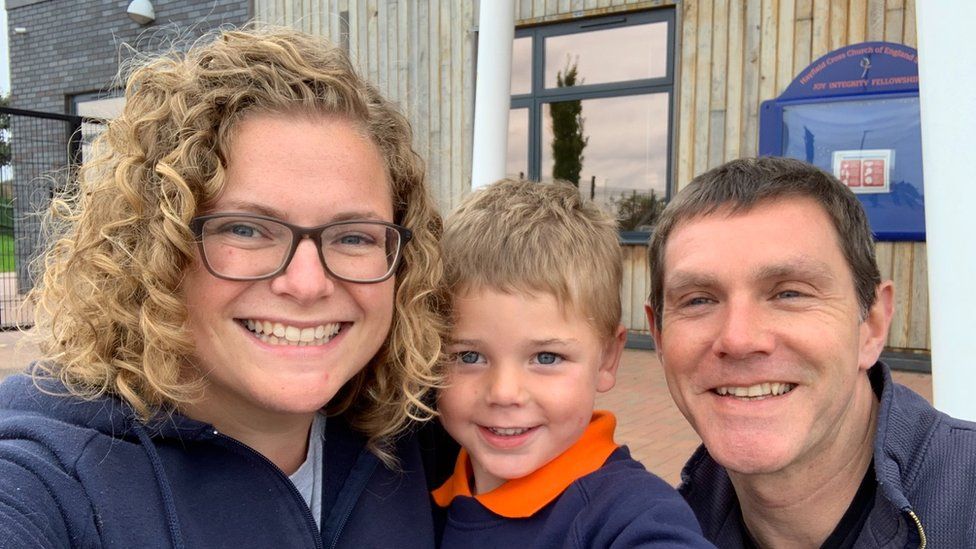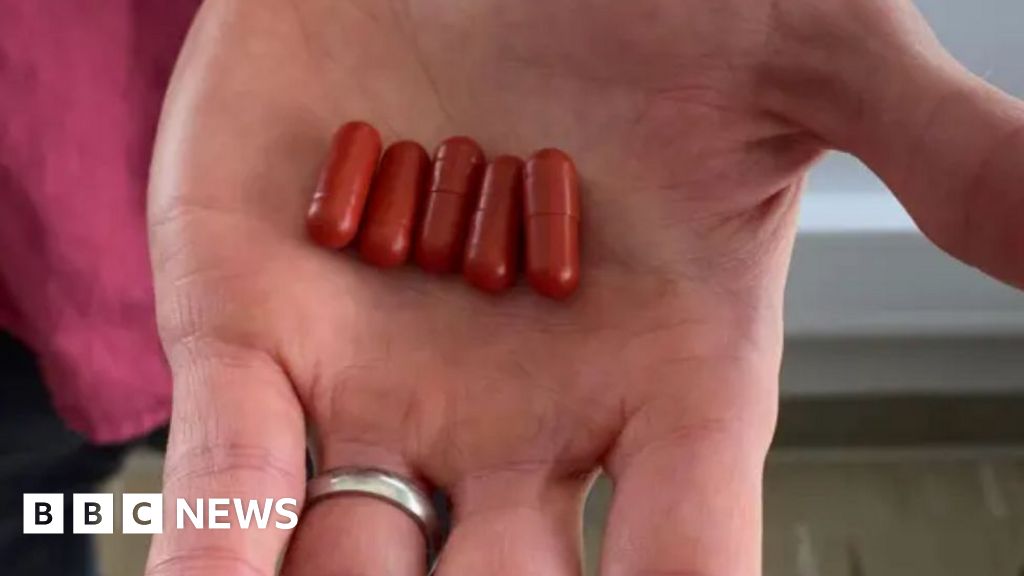ARTICLE AD BOX
By Steve Mellen
BBC News
 Image source, Family photo
Image source, Family photo
Isaac's parents Aimee and Adrian have had to adjust to his illness over the past year
In many ways, Isaac Tilley is like lots of boys his age. The six-year-old loves playing outside, football and rollercoasters. But in other ways he is very different.
Last summer, after testing following two years of mystifying seizures, his parents were told he had Batten disease - one of the symptoms of which is childhood dementia.
As they digested the news about a condition they had never heard of, mum Aimee and dad Adrian were told it meant he would lose his sight and his ability to walk, talk, eat and also his sight, and that he might not live beyond the age of 12.
Mrs Tilley, 35, says the family, who live in Kettering in Northamptonshire, are doing everything they can to make sure his life is as rich as possible.
However, they are also fighting a battle with the body that approves drugs for the NHS to make sure his regular infusions, which keep the worst of his condition at bay, are not taken away.
'Just tell me'
"When I was told the news, it felt like I was sitting still, but the room was spinning," says Mrs Tilley about the day they were sat down in a room at St John Radcliffe Hospital in Oxford to be told what was wrong with their son.
"There were two doctors and a nurse in the room. One of them spent five minutes telling us what it wasn't, until finally I asked him to just tell me what it was.
"I actually asked him if my son was going to die. I think I could cope with anything - just not him being taken away from me.
"We were told a genetic test performed eight months before had returned with a result of CLN2 Batten disease. The result had been delayed due to Covid."
Image source, Family photo
Image caption,Isaac's sister Eva does not suffer from Batten disease, which is inherited
Isaac had struggled to communicate early on in life, and was having speech therapy. Then, aged three, he had his first seizure. Then a second one 10 days later.
That led to a diagnosis of epilepsy, but as the months passed his seizures mystified his consultant.
"The doctors couldn't be certain what type of epilepsy it was. Every time I showed them a video of what was happening to him, they couldn't pinpoint it," says mum.
"Knowing what I know now, the seizures - alongside his diagnosis of Global Developmental Delay - should have been the first two major red flags, but it wasn't picked up on."
Image source, Family photo
Image caption,Isaac struggled with his speech early on, but his seizures did not begin until he was three
In December 2020, now under the care of hospital, Isaac was given new medication for his seizures, and three weeks later began to show worrying signs with his mobility.
Mrs Tilley and doctors wondered if this was a side effect of his new medicine, but specialists said this wasn't the case.
She says she kept pushing for more checks until finally Isaac was referred to other specialists.
There a "barrage" of tests were carried out, she recalls. At the same time, Isaac's mobility was getting worse.
"He was tripping over his feet. He couldn't walk properly. He couldn't ride his bike. His balance was terrible," she says.
"Then we got a phone call in the August of that year asking us to go to Oxford straight away."
Image source, Family photo
Image caption,Isaac remains cheerful despite many regular trips to hospital, his mum says
For the family, getting the news that it was Batten disease began a painful journey of discovery.
"I had never heard of it, and most people I speak to have never heard of it," says Mrs Tilley.
"This is one of the reasons, I'm trying to raise as much awareness as possible because the earlier children get diagnosed, especially with CLN2, the earlier they can get access to the life-prolonging treatment and keep as many of their skills as possible."
In the months since Isaac's diagnosis, his mum says she has become focused on making sure that however long he lives, he has the best time possible.
Image source, Family photo
Image caption,Isaac is "poked and prodded a lot" due to regular medical testing, his mum says
"I just had this spark of a fight in me straightaway," she says.
"My husband asked the doctors in Oxford what life expectancy was and we were told between the ages of six and 12, but maybe longer with treatment.
"I couldn't cry at the time. I was thinking no, this thing is not taking my son without a fight."
Direct brain infusions
Isaac is very used to seeing the inside of hospitals. Every two weeks he is taken to Great Ormond Street Hospital in London, where medicine to fight Batten disease is put straight into his brain through a tube in his skull.
Known as infusions, the treatment slows the progression of the disease by adding Brineura, a synthetic form of an important enzyme, into his brain fluid.
Image source, Family photo
Image caption,Isaac has spent much of the past year in and out of hospital
Children with the disease are missing the TPP1 enzyme, which gets rid of rubbish from brain cells. Without it, the cells deteriorate, causing brain damage.
"Some children do have to be sedated, but Isaac is an absolute star," says his mum.
"He's their star patient because as soon as the doctors come into the room and gown up, he starts watching his iPad and just sits there.
"The treatment takes four hours. Then we have to wait at the hospital for an hour to see if he has any reaction to it. Sometimes he then has to go and have extra tests, like an ECG on his heart."
'He's going to go before I do'
Mrs Tilley says she has to regularly fight her emotions for the sake of her son.
"It's no good if I break down in front of Isaac," she says.
"But there are days when I literally just collapse and cry like a baby. I'm not ashamed to admit that.
"This disease is one of the worst in the world. Young children are not supposed to develop dementia. It is one of those things that you think is not going to happen to you as a mum.
"Even though he is having this treatment, it's not a cure.
"I know he's going to go before I do, but I can't think about that, because it's too painful.
"I am so grateful for the treatment. Isaac has finally started to plateau and is even gaining some words back again - it's amazing."
Making the most of time
The family is fundraising online to help with changes they are having to make to their home because of Isaac's condition, and to give him as many special days as they can, especially while he still has his sight.
"People used to talk to me about creating memories, and I used to think 'how can I do that when there's a massive black cloud over us?'," says Mrs Tilley.
"But it wasn't until we went away, just the four of us in a caravan, and it was the best time.
"We went to the beach and played football, built sand castles, and spent quality time as a family, away from social media and the phones going off constantly.
"We were just happy and it made me think, this is what life is truly about.
Image source, Family photo
Image caption,Isaac's parents say they are keen that what remains of his life is as rich as possible
"Before Battens I would stress about the smallest of things. I'd also worry about money and we'd avoid days out because it was too expensive or there was something else that needed doing.
"But none of that matters anymore - it's just about spending time together and being happy.
"Now I treasure each word, each smile and each gorgeous look of love between Isaac and his older sister Eva [aged nine].
"We have actually booked to go abroad this year, because before he loses his sight I want him to be able to experience the pools, slides, sun and beautiful beaches.
"His sight is already starting to deteriorate, so we probably have got a 12-24 months until his world goes dark."
Battle over medication
As well as battling the emotions that come with having a child with a life-limiting condition, Mrs Tilley has another battle - along with other families with children with CLN2 Batten Disease - to keep Isaac's brain infusions available.
The medicine was first introduced as a trial in 2017, and ran for three years.
Campaign groups wanted it to be made available to all eligible children, but they have come into conflict with the National Institute of Health and Care Excellence (Nice) - the government agency that approves drugs for NHS use.
MPs got involved, questions were asked in Parliament and two families took legal action.
The result was Nice made the treatment available for five years through a Managed Access Agreement (MAA) which stops in 2024.
MAAs are designed to allow small groups of patients prescribed rare drugs to have access to them even when there is some uncertainty about their effectiveness.
Mrs Tilley says the treatment will be re-evaluated by Nice in 2024, something she says is a "complex and stressful process" and presents the danger that families will get "caught in the crossfire" of negotiations over the price of the procedure.
"Even though Nice know the treatment is working we are having to fight to keep our children alive, which is just wrong," she says.
Image source, Family photo
Image caption,The family want to take Isaac to Disneyland before his sight goes
Mrs Tilley says the situation compare unfavourably with cancer patients.
"I know it's a completely different disease, but they are given chemotherapy and radiotherapy to keep them alive as long as possible and give them a good quality of life," she says.
"This [the brain infusions] are prolonging our children's lives and giving them a very good quality of life.
"Parents, alongside the Batten Disease Family Association, are going to have to go through the same fight as in 2019 and try to get Nice to agree to recommend the treatment for use through the NHS.
"Without this treatment Isaac, my thrill-seeking, kind and beautiful boy, will deteriorate at a fast rate and pass away."
Costs 'are considered'
A spokesman for Nice said the MAA was put in place so patients could have access to the "promising" treatment while further research was carried out, with the data being analysed from November 2023.
"The independent Highly Specialised Technology committee will need to assess all the available evidence and consider whether cerliponase alfa [the official name for Brineura] can be recommended for routine use in the NHS," he said.
"The committee considers a range of factors when recommending treatments for use in the NHS, and cost-effectiveness, which considers both the clinical effectiveness and costs associated with the treatment, is one of these considerations."
Find BBC News: East of England on Facebook, Instagram and Twitter. If you have a story suggestion email eastofenglandnews@bbc.co.uk
Related Internet Links
The BBC is not responsible for the content of external sites.

 2 years ago
40
2 years ago
40








 English (US) ·
English (US) ·